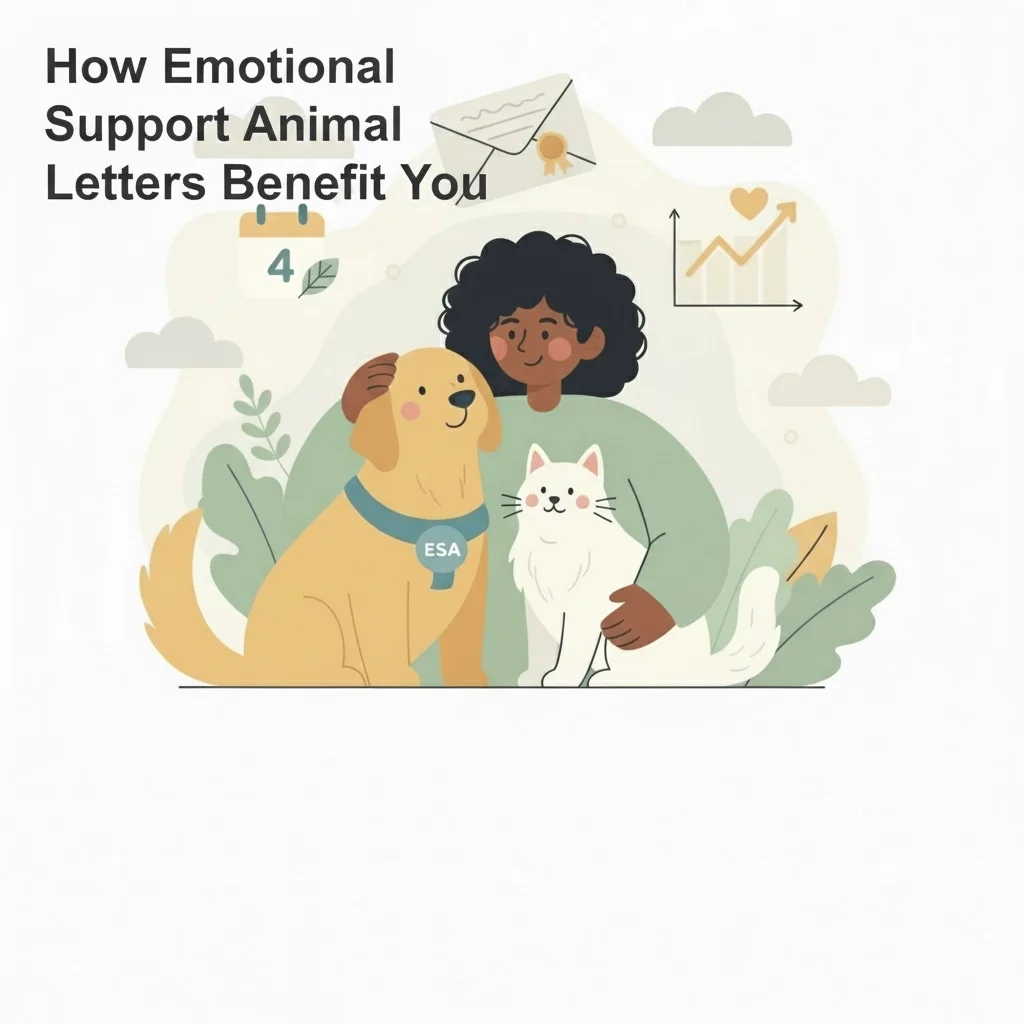How Emotional Support Animal Letters Benefit You: Lessons from 4 Years of Experience with Pettable
Four years ago, I never imagined that writing emotional support animal letters would become one of the most meaningful parts of my practice. But as a licensed clinical social worker, I've had the privilege of working with Pettable to help thousands of people keep the mental health support they desperately needed: their beloved pets.
What started as a way to help clients navigate housing discrimination has evolved into something much deeper. Through countless consultations, assessments, and follow-ups, I've witnessed firsthand how emotional support animals transform lives. These experiences didn't just shape my understanding of human-animal bonds: they became the foundation for Pet Medicine, our holistic approach here at Paws 4 Wellness.
Let me share what I've learned about how ESA letters truly benefit people, because the impact goes far beyond what most people realize.
The Legal Shield That Changes Everything
The most immediate benefit of an ESA letter is protection. Pure and simple. Your letter serves as a legal shield against housing discrimination, allowing you to live with your emotional support animal even in apartments that typically don't allow pets.
I've worked with clients facing eviction notices, outrageous pet deposits, and landlords who simply refused to consider their mental health needs. The ESA letter changes that conversation entirely. Under the Fair Housing Act, landlords must make reasonable accommodations for people with documented disabilities: and your letter provides that documentation.
But here's what surprised me most in my four years of practice: the relief people feel when they get their letter isn't just about keeping their pet. It's about being seen and validated. So many clients have told me, "Finally, someone understands that my dog isn't just a pet: they're my lifeline."
The Mental Health Benefits I See Daily
Through my work with Pettable, I've observed patterns in how emotional support animals help people manage their mental health conditions. The benefits are consistent across different diagnoses, from anxiety and depression to PTSD and ADHD.
For anxiety: Your ESA provides what I call "grounding presence." When panic starts to creep in, having your animal nearby gives you something tangible to focus on: their breathing, their warmth, their steady presence. I've had clients tell me their dog's calm energy literally helps slow their racing thoughts.
For depression: The routine and purpose that comes with caring for an ESA can be life-changing. When getting out of bed feels impossible, knowing your pet needs you creates gentle accountability. It's not the harsh judgment we place on ourselves: it's loving responsibility that pulls us forward.
For PTSD: Many of my clients find their emotional support animals help them feel safer in their own homes. The animal's alertness to sounds and movements can provide early warning systems, while their presence offers comfort during flashbacks or nightmares.
For ADHD: This is where I've seen some of the most interesting benefits. ESAs can serve as external regulation systems, helping people with ADHD develop routines and providing sensory input that helps with focus and emotional regulation.
How This Led to Pet Medicine
After years of seeing these transformations, I realized we were missing something in traditional mental health treatment. We were treating symptoms without fully recognizing one of our most powerful healing resources: the animals already in people's lives.
This insight became the seed for Pet Medicine, our approach that integrates your pet as an active participant in your healing journey. It's not about replacing therapy or medication, but about recognizing and maximizing the therapeutic relationship you already have with your animal companion.
Through my ESA letter work, I learned that people don't just love their pets: they co-regulate with them. They find emotional stability through them. They develop resilience because of them. Pet Medicine simply makes this process more intentional and therapeutic.
The Nervous System Magic
Here's something fascinating I've observed: emotional support animals seem to have an almost supernatural ability to regulate our nervous systems. I've watched anxious clients visibly relax when their dog enters the room during our virtual consultations. Their shoulders drop, their breathing slows, their voice becomes calmer.
This isn't just emotional: it's physiological. Your ESA can help activate your parasympathetic nervous system (your "rest and digest" mode) simply through physical contact. Petting your animal releases oxytocin, reduces cortisol, and can actually lower your blood pressure and heart rate.
What struck me most was how automatic this process becomes. You don't have to think about it or work at it. Your nervous system naturally syncs with your animal's calm energy. It's like having a built-in anxiety management system that works 24/7.
Empowerment for Neurodivergent and Sensitive People
In my four years of ESA letter practice, I've worked with many neurodivergent individuals and highly sensitive people. For this population, emotional support animals offer something particularly powerful: acceptance without judgment.
Your ESA doesn't care if you're having a bad brain day. They don't judge your sensory sensitivities or your need for routine. They don't make you feel "different" or "difficult." Instead, they provide steady, unconditional support that helps you navigate a world that often feels overwhelming.
I've seen clients with autism spectrum conditions find comfort in their animal's predictable presence. People with high sensitivity discover that their ESA helps buffer overwhelming stimuli. Those with ADHD find that their pet provides just the right amount of sensory input to help them focus.
The ESA letter validates these needs and ensures you can keep your support system close, whether you're moving apartments, dealing with housing discrimination, or simply needing legal documentation of your therapeutic relationship with your animal.
The Assessment Process: What Really Matters
During my ESA assessments with Pettable clients, I focus on understanding the specific ways your animal helps you manage your mental health symptoms. It's not about proving you're "sick enough": it's about documenting the legitimate therapeutic relationship you have with your pet.
I look for things like: How does your animal help you during anxiety episodes? Do they provide comfort during depression? Do they help you maintain routines? Do they offer sensory regulation? Do they help you feel safer or more grounded?
These aren't frivolous questions. They're about understanding how your animal contributes to your overall mental health stability and quality of life. The letter I provide isn't just paperwork: it's clinical documentation of a real therapeutic relationship.
Building Emotional Resilience Together
One of the most beautiful things I've witnessed is how people and their emotional support animals build resilience together. Your ESA doesn't just help you cope with symptoms: they help you develop stronger emotional muscles over time.
Through daily interactions with your animal, you practice patience, consistency, and unconditional love. You learn to read nonverbal cues and respond to needs other than your own. You develop a sense of purpose and meaning that extends beyond your own struggles.
This is why the Pet Medicine approach we've developed at Paws 4 Wellness goes beyond traditional ESA support. We help you actively engage with your animal as a partner in your healing journey, maximizing the therapeutic potential that's already there.
The legal protection of an ESA letter is just the beginning. The real magic happens in the daily moments of connection, regulation, and growth you experience with your animal companion. After four years of witnessing these transformations, I can say with certainty: this relationship isn't just helpful: it's healing.
If you're considering an ESA letter, know that you're not asking for special treatment. You're accessing a legitimate form of mental health support that happens to have four legs and unconditional love to offer.
Click Here to See if you Qualify
About the Author
Jennifer Bronsnick, MSW, LCSW, is a licensed clinical social worker with over 20 years of experience supporting anxiety, ADHD, and emotional overwhelm. She is the founder of Paws 4 Wellness and the creator of Pet Medicine: a gentle, science-backed framework that uses the human–animal bond to help people regulate their nervous systems, feel safer in their bodies, and build everyday emotional resilience. Jennifer believes pets are not just companions: they're co-regulators, teachers, and anchors back to wholeness.
Explore pet-powered practices, free resources, and the Paws 4 Wellness community:
👉 https://linktr.ee/paws4wellness

